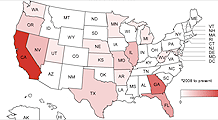U.S. bank failure tally reaches 133
Regulators close regional banks in Florida, Kansas and Arizona, at a cost of $252.1 million to the FDIC.
NEW YORK (CNNMoney.com) -- Regulators closed regional banks in three U.S. states Friday, bringing the total number of failed banks this year to 133, the Federal Deposit Insurance Corp. said.
Customers of the failed banks are protected. The FDIC, which has insured bank deposits since the Great Depression, currently covers accounts up to $250,000.
In Florida, the Office of the Comptroller of the Currency (OCC) closed Republic Federal Bank, NA, and the FDIC was named receiver.
The four offices of the Miami-based bank will reopen Monday as branches of 1st United Bank, which is based in Boca Raton, Fla.
1st United will acquire all of the failed bank's $352.7 million deposits. It will also buy $267.1 million of the $433 million worth of assets Republic Federal had on its books as of late September.
Elsewhere, state regulators in Kansas closed the six branches of SolutionsBank, which is based in Overland Park.
Arvest Bank, of Fayetteville, Ark., will assume all of the failed bank's $421.3 million worth of deposits and will purchase all of its $511.1 million in assets. SolutionsBank branches will reopen Monday as branches of Arvest Bank.
The sole branch of Mesa, Ariz.-based Valley Capital Bank, NA, was closed by the OCC. Its roughly $41 million in deposits and $40 million in assets will be assumed by Enterprise Bank & Trust, of Clayton, Miss.
The FDIC said customers of the failed banks can access their money over the weekend by writing checks or using ATMs or debit cards. Checks will continue to be processed, and borrowers should make mortgage and loan payments as usual.
An average of 11 banks have failed per month this year, and the FDIC's deposit insurance fund has slipped into the red for the first time since 1991.
As of the end of September, the fund was $8.2 billion in the hole. But that figure includes $21.7 billion the agency has earmarked for future bank failures.
Friday's failures of the three banks will cost the FDIC an estimated $252.1 million.
The fund is expected to move back into the black by 2012 as banks repay their insurance premiums over the next three years, which the FDIC says could raise $45 billion.
This year's tally of bank failures is the highest number since 1992, when 181 banks failed. But the total is far from 1989's record high of 534 closures which took place during the savings and loan crisis, when the insurance fund also carried a negative balance. ![]()


